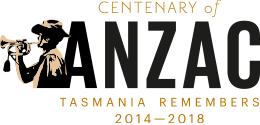- Home
- About
-
History
- Timeline
- Shared stories
- Share your story
- Armistice Centenary
- Tasmania’s Victoria Cross Legacy
- Women and war
- Tasmanian Aboriginal soldiers
- Did you know?
- Caring for military memorabilia, medals and photos
- A guide to preserving Tasmania's war heritage
- 40th Battalion
- 12th Australian Infantry Battalion
- Royal Australian Air Force
- Royal Australian Navy
- Battle of the Somme
- War and sport
- Activities
- Grants and Programs
- News
- Contact
- Home
- About
-
History
- Timeline
- Shared stories
- Share your story
- Armistice Centenary
- Tasmania’s Victoria Cross Legacy
- Women and war
- Tasmanian Aboriginal soldiers
- Did you know?
- Caring for military memorabilia, medals and photos
- A guide to preserving Tasmania's war heritage
- 40th Battalion
- 12th Australian Infantry Battalion
- Royal Australian Air Force
- Royal Australian Navy
- Battle of the Somme
- War and sport
-
Activities
- Calendar of events
- Dig for the Diggers - one act play
- ANZAC Day
- Launch of Tasmania’s Centenary of ANZAC Commemorations
- Remembrance Day
- 10,000 Steps Challenge
- Hartzview marks World War One
- Australian Living Memorials
- Journey Across the Strait
- Lone Pine seedlings
- How Tasmanians commemorated the Centenary
- The Odd Angry Shot
- Grants and Programs
-
News
- Newsletters
- Australian War Dogs
- Students travel to Gallipoli
- ANZACs Remembered – Commemorative Medallion
- ANZAC Day 2021 - Light up the Dawn
- Anzac Day 2021
- A valuable archive of over 130 operational maps
- Ecumenical Church Service
- Simpson Prize
- Our Victoria Cross Heroes book launch
- Nominations open for Tasmanian Honour Roll of Women
- Remembering South Hobart people who served
- Vintage Peace Postcard from 1916 Reprinted
- Sites of Significance Then and Now
- Commemorative Medallion for Second World War veterans
- Victory in Pacific 75th Anniversary
- Public consultation sought for Terms of Reference on Royal Commission
- Contact
- Timeline
- Shared stories
- Share your story
- Armistice Centenary
- Tasmania’s Victoria Cross Legacy
- Women and war
- Tasmanian Aboriginal soldiers
- Did you know?
- Caring for military memorabilia, medals and photos
- A guide to preserving Tasmania's war heritage
- 40th Battalion
- 12th Australian Infantry Battalion
- Royal Australian Air Force
- Royal Australian Navy
- Battle of the Somme
- War and sport
Captain Cecil McVilly

Captain C. L. McVilly (right), speaks with some local children seated on the ground. In the background is a convoy of over ten Ford vans ready for departure. The main purpose of Dunsterforce was to reorganise resistance in Mesopotamia and Persia to German penetration of Asia during the period 1918 to 1919. Australian War Memorial P02317.026
Born: 3 August 1889
Enlisted: 19 July 1915
Occupation: Commercial traveller
One of the best amateur scullers Australia has ever produced
Tasmania’s first Olympian was rower Cecil McVilly who enlisted with the 40th Battalion on 19 July 1915.
In 1910 the interstate rowing championships were held for the first time in Tasmania. McVilly, a local sculler from the Derwent Rowing Club, in Hobart, won the national title in front of a large crowd of onlookers.
In 1911 he retained the national sculling title by winning the annual interstate contest on the Parramatta River, in New South Wales.
Cecil McVilly was selected to row in the single sculls at the Stockholm Olympics in 1912. He was first across the line in his heat but during the race steering problems with his boat had caused him to foul his German opponent. He was disqualified.
In 1913, McVilly returned to Europe and became the first Australian-based rower to win the Diamond Challenge Sculls at Royal Henley. For that achievement, over 30 years later, he was retrospectively awarded a Helms Trophy as the ‘foremost amateur athlete in Australasia’.
Cecil McVilly regained his sculling title at the interstate eights and sculling contests in Victoria in 1914, where he was also coach of the Tasmanian eight. The crew of the eight included Frederick House.
During World War One, Captain McVilly served in France and the Middle East. During his war service he was wounded twice, on one occasion experiencing severe abdominal injuries.
Captain McVilly was awarded the Military Cross “for conspicuous gallantry and devotion to duty he handled his Company with great skill, leading them to their assembly position, through an intense enemy bombardment during which he maintained splendid control of this men and also set a very fine example by his personal courage. He has on previous occasions commanded raiding parties and displayed abilities of a very high order.”
Captain McVilly was also Mentioned in Despatches.
After World War One, Cecil McVilly continued his interest in rowing. In 1926 he coached the Tasmanian team in men’s interstate championships on the Brisbane River. The Tasmanian eights won by a length in from South Australia. At this time Cecil McVilly was also Secretary of the Tasmanian Rowing Association.
McVilly Close in the Canberra suburb of Gordon is named in his honour.
Cecil McVilly died on 4 November 1964
Acknowledgement
Rowing research by Robin Poke, sports historian.


